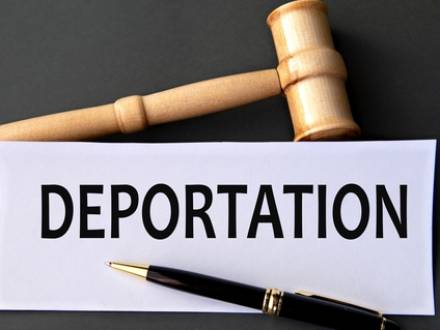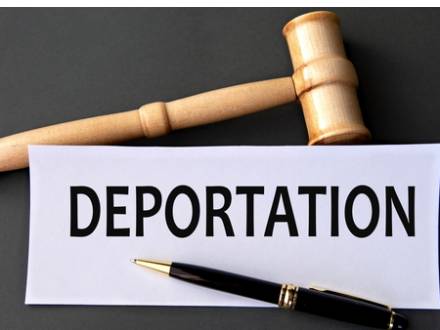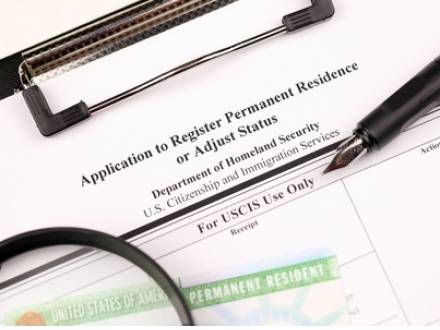Recent Blog Posts
What Effect Would Senate Bill 8 Have on Deportations?
 Last week, proposed Texas Senate Bill 8 garnered both support and very vocal opposition. If SB8 passes, it would require cooperation and collaboration between county sheriff’s departments across the state and Immigration and Customs Enforcement (ICE) as they work to locate and deport undocumented immigrants. SB8 would require larger sheriff’s departments – in counties with more than 100,000 residents – to accept these ICE partnerships.
Last week, proposed Texas Senate Bill 8 garnered both support and very vocal opposition. If SB8 passes, it would require cooperation and collaboration between county sheriff’s departments across the state and Immigration and Customs Enforcement (ICE) as they work to locate and deport undocumented immigrants. SB8 would require larger sheriff’s departments – in counties with more than 100,000 residents – to accept these ICE partnerships.
Under the Senate Bill, some funds would be available for smaller counties. Since virtually everything related to immigration and deportation is currently in flux, speaking to an experienced Plano, TX immigration attorney can be beneficial if you have questions about your immigration status or need assistance with any immigration issue.
What is a Waiver of Admissibility for Health-Related Grounds?
 Before an individual can enter the U.S. as an immigrant or when seeking a status adjustment, a health screening is required. This health screening is a requirement under INA Section 212(a)(1) and is meant to stop certain immigrants with specific medical diseases from entering the U.S.
Before an individual can enter the U.S. as an immigrant or when seeking a status adjustment, a health screening is required. This health screening is a requirement under INA Section 212(a)(1) and is meant to stop certain immigrants with specific medical diseases from entering the U.S.
Health screenings are considered justified based on hazards to the health and safety of the public or because certain diseases or illnesses could place a substantial financial burden on the public. In certain limited cases, an inadmissibility waiver may be qualified for (when available) if a green card holder or United States citizen assumes responsibility for any medical expenses related to the identified health issue.
Immigration issues are changing rapidly under the new administration, with many immigrants in a state of uncertainty. If you are seeking a waiver of admissibility on health-related grounds, it is important that you speak to an experienced Plano, TX immigration lawyer. This can help you determine the best way to maintain your current immigration status or seek a change in your status while potentially avoiding removal or deportation.
What is Involved in a Green Card Marriage Interview?
 While the entire green card marriage process can be complex and full of stumbling blocks, perhaps no part of it is as nerve-wracking as the required in-person interview. During the interview, a USCIS employee or a consular officer evaluates the legitimacy of the marriage to ensure it is not only for immigration benefits.
While the entire green card marriage process can be complex and full of stumbling blocks, perhaps no part of it is as nerve-wracking as the required in-person interview. During the interview, a USCIS employee or a consular officer evaluates the legitimacy of the marriage to ensure it is not only for immigration benefits.
Questions during the green card marriage interview will focus on the history of the couple’s relationship, their future plans, and what type of daily activities they commonly perform as a married couple. While each green card marriage interview is unique in some way, an experienced Plano, TX immigration attorney can help prepare you for the interview so you will have the best possible outcome.
Requirements for a Marriage Green Card
Eligibility for a marriage green card includes the following:
TX National Guard Given Authority to Make Immigration Arrests
 The Governor of Texas has given National Guard soldiers the authority to make immigration arrests. Prior to this, only U.S. Customs and Border Protection officials could detain and deport undocumented immigrants. The National Guard members who exercise this new authority are supposed to be in contact with a CBP official "at all times," but this contact can be via cellphone, radio, or "other technology," according to the agreement.
The Governor of Texas has given National Guard soldiers the authority to make immigration arrests. Prior to this, only U.S. Customs and Border Protection officials could detain and deport undocumented immigrants. The National Guard members who exercise this new authority are supposed to be in contact with a CBP official "at all times," but this contact can be via cellphone, radio, or "other technology," according to the agreement.
Governor Abbott has been sending Texas National Guard members to the border under Operation Lone Star for the past four years, but up until now, those members have acted only in a support role. As this is the first agreement of its kind, there may be lawsuits challenging the legality of this move. Typically, National Guard units are not considered law enforcement agencies, although they are used to "augment" police agencies under certain circumstances.
House Passes Measure to Deport Migrants for Theft
 While not yet passed into law, the first bill of 2025 introduced by House Republicans and named after slain Georgia student Laken Riley, would require the detention of any migrant arrested for theft. This legislation is intended to honor the young woman killed by a Venezuelan migrant arrested for shoplifting prior to the attack.
While not yet passed into law, the first bill of 2025 introduced by House Republicans and named after slain Georgia student Laken Riley, would require the detention of any migrant arrested for theft. This legislation is intended to honor the young woman killed by a Venezuelan migrant arrested for shoplifting prior to the attack.
The bill has both proponents and advocates in Congress and the Senate. Immigration issues are likely to become much more complex in the coming months. If you or a loved one is facing an immigration issue or fears deportation, speaking to a Plano, TX immigration attorney can be a positive step.
Information Regarding the House Bill
The bill was first introduced last March but failed to be approved by the Senate. If passed into law, it would require the detention of migrants in the U.S. seeking asylum who have been accused of theft, burglary, or shoplifting. The bill has caused some concern because it requires detention for those charged or arrested rather than convicted.
USCIS Redesign of Naturalization Test Crashes and Burns
 The U.S. Citizenship and Immigration Services (USCIS) recently announced it was scrapping the new version of the naturalization test. After introducing the new design, criticism from all directions caused the agency to reinstate the old test, at least for the time being. USCIS began the redesign in 2022 to reduce undue barriers to taking the naturalization test. According to the feedback, the new test had the exact opposite effect, resulting in the proposed new test being terminated.
The U.S. Citizenship and Immigration Services (USCIS) recently announced it was scrapping the new version of the naturalization test. After introducing the new design, criticism from all directions caused the agency to reinstate the old test, at least for the time being. USCIS began the redesign in 2022 to reduce undue barriers to taking the naturalization test. According to the feedback, the new test had the exact opposite effect, resulting in the proposed new test being terminated.
Immigration is a complex issue, with many different pathways to living and working in the U.S. on a visa and becoming a U.S. citizen. The citizenship test is one of the final stages of the naturalization process. The current test has two parts – a civics test to assess the applicant’s knowledge of U.S. history and government and an English test to assess the applicant’s speaking, writing, and reading abilities. Those seeking to become U.S. citizens should speak to an experienced Plano, TX immigration attorney to determine the necessary steps in the process.
Why Having a Plan in the Event of Deportation Is Crucial
 Undocumented immigrants in Texas and across the United States are bracing for January 20th, when the new administration takes place. Migrant rights groups are warning undocumented Texans to prepare themselves, including making plans for their loved ones, in the event the worst-case scenario becomes a reality. Data indicates there are approximately 11 million undocumented immigrants who face the possibility of deportation/removal.
Undocumented immigrants in Texas and across the United States are bracing for January 20th, when the new administration takes place. Migrant rights groups are warning undocumented Texans to prepare themselves, including making plans for their loved ones, in the event the worst-case scenario becomes a reality. Data indicates there are approximately 11 million undocumented immigrants who face the possibility of deportation/removal.
The cost of deporting this many people is estimated to take up to an entire decade, costing almost a trillion dollars. The current plan would require building huge detention camps, hiring thousands of new ICE and Border Patrol employees, and expanding immigration courtrooms by adding 1,000 new courtrooms specifically for immigration proceedings.
While it is still unclear how these removal proceedings would work, there is considerable uncertainty among undocumented immigrants – some of whom have been living, working, and raising families in the U.S. for decades. Anyone facing such uncertainty should first speak with a knowledgeable Plano, TX immigration attorney. While it is hoped that you will never face removal or deportation, you should definitely explore all your options and have a plan in place.
Uncertainty Returns to DACA Recipients with New Administration
 A child who was brought to the United States when her parents fled Mexico’s violence has spent most of her life haunted by the possibility of deportation. In 2012, there was a brief reprieve when this young woman received a letter detailing her acceptance into a program for immigrants like her who were brought to the U.S. as children. The program was the Deferred Action for Childhood Arrivals (DACA) brought by the Obama administration.
A child who was brought to the United States when her parents fled Mexico’s violence has spent most of her life haunted by the possibility of deportation. In 2012, there was a brief reprieve when this young woman received a letter detailing her acceptance into a program for immigrants like her who were brought to the U.S. as children. The program was the Deferred Action for Childhood Arrivals (DACA) brought by the Obama administration.
The program granted two-year renewable permits, allowing these "Dreamers" a legal immigration path. However, the new administration taking office on January 20th could end the temporary relief afforded this young woman and so many more. Unfortunately, uncertainty has become a way of life for DACA recipients; after a judge deemed the program illegal in 2021, no new applicants have been accepted.
New applications could not be processed at that time, although current recipients were allowed to renew DACA permits. DACA permits have allowed these young adults to obtain a driver’s license, work in the U.S. legally, and even get healthcare. These Dreamers have started their own families, purchased homes, paid their taxes, attended school, and lived as Americans, yet this could all come to an end when the new administration takes over.
What Happens During a Naturalization Interview?
 Residents of the United States who want to become U.S. citizens must attend a naturalization interview. This interview is a key step in the citizenship process and applicants must pass it before taking the Oath of Allegiance. The session is designed to confirm an applicant’s identity, evaluate his or her level of fluency with the English language, and test his or her knowledge of U.S. history and government. Failure to pass the interview can block an applicant from attaining citizenship, which is why it is best to prepare by consulting a Texas immigration attorney who is familiar with the process.
Residents of the United States who want to become U.S. citizens must attend a naturalization interview. This interview is a key step in the citizenship process and applicants must pass it before taking the Oath of Allegiance. The session is designed to confirm an applicant’s identity, evaluate his or her level of fluency with the English language, and test his or her knowledge of U.S. history and government. Failure to pass the interview can block an applicant from attaining citizenship, which is why it is best to prepare by consulting a Texas immigration attorney who is familiar with the process.
What Happens in a Naturalization Interview?
The naturalization interview is administered by an officer from the U.S. Citizenship and Immigration Services (USCIS). You will be asked to bring proof of identification, including your green card, and take an Oath of Truthfulness in which you promise to tell the truth.
How Do I Know if I Am Eligible for Adjustment of Status?
 When someone wants to apply for permanent residency in the United States — also referred to as getting a green card — there are two options: consular processing and adjustment of status. Consular processing is when the applicant is outside the U.S. and applies for a green card through the U.S. embassy in his or her home country. An adjustment of status, on the other hand, is when a person applies for a green card while in the United States.
When someone wants to apply for permanent residency in the United States — also referred to as getting a green card — there are two options: consular processing and adjustment of status. Consular processing is when the applicant is outside the U.S. and applies for a green card through the U.S. embassy in his or her home country. An adjustment of status, on the other hand, is when a person applies for a green card while in the United States.
To apply for adjustment of status, you need to fulfill certain criteria. These conditions are not always easy to meet, so it is best to consult a Texas immigration attorney about your eligibility for a green card. Here are some of the requirements for adjustment of status in the United States.
You Must Have No Grounds of Inadmissibility
The United States Customs and Immigration Services (USCIS) has a list of factors that make someone ineligible for a green card. These are called grounds of inadmissibility, and they include:






